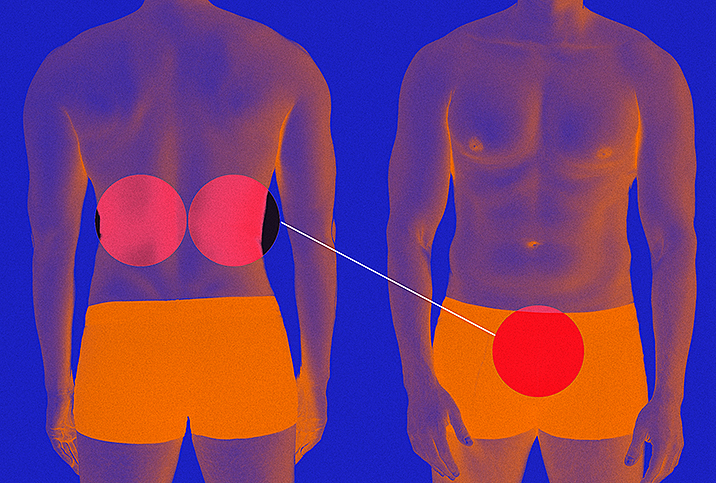What Could Be Causing My Partner's Erectile Dysfunction?

If your partner consistently struggles to get or maintain an erection firm enough for sex, they might have erectile dysfunction (ED). Along with premature ejaculation, ED is one of the most common sexual dysfunctions in men, with one 2018 review indicating it affects about one-third of men. A 2017 study published in The Journal of Sexual Medicine suggests ED affects as many as 47 million men in the Unites States.
Still, it can be difficult not to take it personally, but the truth is there are about 99 reasons for erectile dysfunction, and you're probably not one of them.
Here's a look at some of the most common physical, psychological and lifestyle factors that can affect a guy's sexual function.
Can low testosterone cause ED?
"Among other functions, testosterone contributes both physically and psychologically to men's erections," said Michael Werner, M.D., the medical director and founder of Maze Sexual & Reproductive Health, based in New York City and Purchase, New York.
Along with hair loss and metabolic changes, common symptoms of low-T include fatigue and diminished libido, which can make a man less interested in sex. It can adversely affect tissues and mechanisms within the penis.
Low testosterone is frequently associated with underlying health conditions, such as obesity, that can cause ED. Low testosterone, or testosterone deficiency, affects from 10 percent to 40 percent of men globally, but the range used to diagnose low-T varies widely, making a solid number hard to arrive at.
"Along with negatively affecting testosterone levels, obesity can contribute to vascular issues, which are the leading cause of erectile dysfunction," said Christopher C. Kyle, M.D., a urologist with the Oregon Urology Institute in Springfield, Oregon.
In fact, ED can be a "canary in the coal mine," a warning sign of more severe conditions, such as heart disease—and that has nothing to do with his partner.
To achieve and maintain an erection, blood has to flow into and remain in the penis, just as blood must flow in and out of the heart to keep it pumping. The penile veins are much smaller than those in the heart, so symptoms of issues such as atherosclerosis—clogged arteries—often appear first in the penis.
"It's a delicate balance of inflow and outflow," Kyle said. "When there's something that disrupts that, that's what can cause problems with erections."
Besides atherosclerosis, common conditions that can throw things off-kilter include high cholesterol, high blood pressure, diabetes and metabolic syndrome.
Other physical conditions associated with ED include thyroid dysfunction, multiple sclerosis (MS), Parkinson's disease, pelvic surgeries or injuries and cancer, such as testicular and prostate cancer.
Age plays a role, too. That's largely because a man's testosterone levels decrease, while his risk of cardiovascular disease increases, with time.
"What I always tell patients of any age is that it's part of the aging process," Werner said. "So if you're a man and you're lucky to live long enough, you will have erection issues. It's just like if you live long enough, you will need reading glasses."
Can stress cause ED?
"There are physiologic causes of erectile dysfunction and psychological causes of erectile dysfunction, and it's usually some combination of both," Kyle said.
"Even men with perfectly functioning penises can develop ED due to mental health issues," Werner said. "That's because the brain plays a key part in libido and arousal."
Conditions such as stress, anxiety, depression and attention deficit hyperactivity disorder (ADHD) can impede everything from a guy's confidence to his brain's ability to signal the penis to become erect. Additionally, stress and other mental health conditions can contribute to physical problems, such as high blood pressure and obesity, that can affect the penis.
"Stress and anxiety-related ED can originate with relationship issues, but that's not usually the case. However, the shame and embarrassment associated with ED can compound stress and performance anxiety and worsen ED," Kyle said.
That's why, when discussing ED with a partner, it's important to be compassionate and broach the topic gently. Do it with clothes on, preferably at the breakfast table and not in the bedroom.
"What may have started as a mild problem with erections can really spiral, so men are afraid to engage in sexual activity or intimate time with their partner because they're worried that they're going to have trouble with erections," Kyle said.
Can alcohol cause erectile dysfunction?
It's common for guys of any age to experience the occasional bout of "whiskey dick" after having a few too many drinks, but routinely overdoing it can lead to ED, among other health problems, experts said.
"Excess alcohol use can affect things both from a physiological and psychological standpoint," Kyle said, noting that it can cause ED, premature ejaculation and low libido.
"One reason is that alcohol abuse can impair testosterone production and shrink the testes," Werner said, which can contribute to infertility in addition to ED.
It also diminishes dopamine, which can lower libido and interfere with the brain-penis communication pathway.
Alcohol use can contribute to or exacerbate other chronic conditions, such as depression and cardiovascular disease, that impact sexual function.
Another lifestyle factor commonly associated with ED is smoking. In the short-term, nicotine causes the blood vessels to constrict, Werner said, which can immediately impede erections. In the long term, smoking can substantially increase the risk of heart attack or stroke and atherosclerosis, affecting blood flow to the penis.
The bottom line
Erectile dysfunction is common, especially among guys 40 and older. The good news is it's highly treatable and, more often than not, indicates an underlying health condition, not relationship troubles.
"A lot of this is physical and may not at all be a reflection of the way their partner is feeling about them. They could find them very attractive sexually, really want to have sex with them, but physically they're not getting the erection," Werner said. "So, it's really important not to take it personally and realize that this is often just a part of aging that needs to be addressed rationally and with support, without (them) feeling rejected."


















